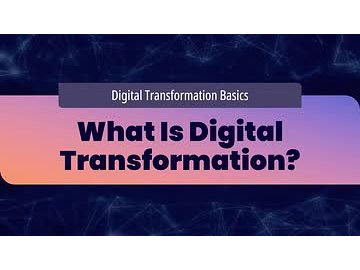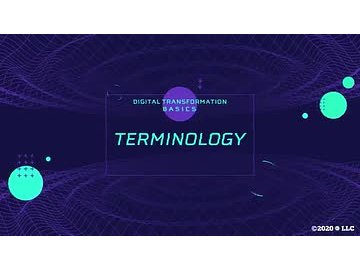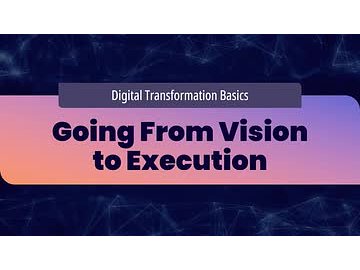Digital Transformation
Last Updated 11/2025
English
30-Day Money Back Guarantee
Full Lifetime Access
Finish in
100 mins! Run Time
100 mins! Run Time
Made for for
Employees
only
Employees
only
Certificate
of Completion
of Completion
Mobile -
Friendly
Access
Friendly
Access
What you'll learn
Digital Transformation Basics: What Is Digital Transformation?
Digital Transformation Basics: Terminology
Digital Transformation Basics: Workplace Culture and Digital Transformation
Digital Transformation Basics: Going From Vision to Execution
Digital Transformation for Leaders: Business Leaders - What's Your Role?
Digital Transformation for Leaders: Considering Your Business
Digital Transformation for Leaders: The ROI of Digital Transformation
Digital Transformation for Leaders: Enhancing Your Customer Experience
Digital Transformation for Leaders: Utilizing Your Data
Digital Transformation for Tech Leaders: Tech Leaders - What's Your Role?
Digital Transformation for Tech Leaders: Making Your Infrastructure Work
Digital Transformation for Tech Leaders: Cloud Management
Digital Transformation for Tech Leaders: Dispersing the Data
Key Words
Description
A digital transformation is something that every business, regardless of size or industry, needs to consider. If you're unfamiliar with what exactly a digital transformation is, then this series is for you. It's a broad term, but it fundamentally changes how you operate internally and how you deliver value to your customers. In this first program, we'll take a deeper look at what digital transformation really means and go over the history of digitization. We'll also discuss how to reimagine your workplace to uncover the potential of a digital overhaul.
System Requirements
• Windows 7 and newer
• Mac OS 10 and newer
Supported Browsers:
The current and previous major releases of the following browsers
• Safari v11 and higher
• Firefox v65 or higher
• Chrome v70 and higher
• Microsoft Edge v42 and higher
• Internet Explorer v11 and higher (Windows only- may exhibit visual differences from other
browsers)
Computer Speed and Processor:
• Use a computer 5 years old or newer when possible.
• 1GBofRAM
• 2GHz processor
Digital Transformation

Digital Transformation Basics: What is Digital Transformation?
Digital transformation is reshaping how businesses operate and deliver value. It involves integrating digital technology across processes, culture, and customer interactions to stay competitive in a rapidly changing environment. In this course, you'll explore what digital transformation means, why it matters, and how organizations can successfully implement it.

Digital Transformation Basics: Terminology
Unlock the language of digital transformation to strengthen communication and decision-making in a technology-driven workplace. Explore key terms such as digitization, cloud computing, big data, and artificial intelligence, with clear explanations and practical examples. By mastering this vocabulary, you'll gain the confidence to engage in digital discussions, recognize opportunities for innovation, and support successful transformation initiatives.

Digital Transformation Basics: Workplace Culture and Digital Transformation
Business leaders are embracing digital transformation because they know it's the only way to stay relevant. But as companies advance from pilot programs to wide-scale implementation, they often run into an unexpected obstacle - workplace culture conflict. This massive, digital overhaul requires company-wide adoption and collaboration. How can your company make this transformation as seamless as possible within its own walls? In this course, we'll talk through various ways to implement a successful digital transformation with the buy-in and support of your entire team.

Digital Transformation Basics: Going From Vision to Execution
Moving from vision to execution is one of the greatest challenges in digital transformation. Structured steps help organizations align strategy, technology, and culture for lasting impact. Key themes include redefining business processes, engaging employees, fostering collaboration, and phasing implementation to reduce risks.

Digital Transformation for Leaders: Considering Your Business
While a digital transformation can be greatly beneficial, it can also be costly and time-consuming. There are many factors to consider before your company should make the decision to undergo a transformation. That's what this course is all about. We'll discuss how the size of your business, budget, and team competencies should factor into this decision. We'll go over questions you need to ask yourself before you move forward, including how new technology will help your business, how long that technology will last, and how much you should be paying attention to changes in the marketplace.

Digital Transformation for Leaders: The ROI of Digital Transformation
We know that a digital transformation will cost your company money and time, so how do we know if it's worth it? In this course, we'll go over some helpful ways to determine your return on investing in a digital transformation. We'll take a look at a framework, provided by PricewaterhouseCoopers, of key performance indicators you can use to measure the impact of digital transformation on various silos of your business. We'll talk about determining the impact on your customers, employees, and company operations. We'll also discuss digital security and infrastructure.

Digital Transformation for Leaders: Enhancing Your Customer Experience
A digital transformation isn't only for your internal operations. One of its biggest benefits is to transform the way customers interact with you, your products, and your entire ecosystem. You first have to determine what your customers want from your business. Fortunately, there have been some great studies on what customers want out of digital technologies in the businesses they interact with. In this course, we'll talk about what some of those survey results show and what they mean to your business.

Digital Transformation for Leaders: Business Leaders - What's Your Role?
According to Tech Republic, 41% of senior leaders surveyed said their digital transformation efforts have been a "waste of time." Yikes. The whole point of digital transformation is to improve your customer experience and gain a good return on investment. How do we succeed at this and avoid the waste of time and money? That's what this course will dive into. As a leader, you should be a key player, continually, throughout the digital transformation process. Your role might involve many things like doing research, creating a vision, getting buy-in, and finding the right people to do the work. Here, we'll discuss these actions more in depth, and go over what and how much influence you should have over the digital transformation process.

Digital Transformation for Leaders: Utilizing Your Data
As you're digitally transforming your company, accumulating multiple new channels of communications, you're going to be presented with data. Lots and lots of data. Daunting? Yes, but highly profitable when used to your advantage. In this course, we'll discuss Big Data and the various ways you can collect and arrange it. We'll also go over what it can do for your company, including improving your customers' experiences, your employees' performance, and your customer service capabilities.

Digital Transformation for Tech Leaders: Tech Leaders - What's Your Role?
As a tech leader, a large part of the ongoing digital transformation process will fall under your supervision. Even if it's not something you're directly overseeing, the acquisition of new technologies, the adoption of those technologies into various departments, the recommendations of technology-based processes, skills training, and so much more are all things other leaders may come to you for. Which is why it's important that we talk about your role in a digital transformation. In this program, we'll discuss what you may be doing throughout the process, including gaining commitment from your teams, researching and planning, defining roles, responsibilities, and priorities, and more.

Digital Transformation for Tech Leaders: Making Your Infrastructure Work
As a tech leader, you're looking to modernize and adopt newer technologies through digital transformation. But your infrastructure likely has outdated hardware, software, and communications systems that don't have the flexibility and agility you need to deliver high-quality results in a cost-effective manner. In this course, we'll talk about transforming your infrastructure to keep up with evolving business demands. We'll discuss infrastructure goals, transformation technologies, data storage, and more.

Digital Transformation for Tech Leaders: Cloud Management
Possibly the most widely-used technology in digital transformation is cloud computing, which is the on-demand availability of resources, like data storage and computing power, without direct management by the user. Your business probably already uses cloud services in some way, so you should know how it can automate business processes and improve employee efficiency. In this program, we'll discuss the vast benefits of using cloud computing and go over how to properly integrate and deploy a cloud model to take advantage of those benefits. We'll talk about the different deployment models and cloud management platforms.

Digital Transformation for Tech Leaders: Dispersing the Data
Throughout your company's digital transformation, you'll be communicating with more and more customers, partners, vendors, and employees. With each new channel that opens up, whether it's social media, the internet of things, or a new application, you're going to be presented with lots and lots of data. In this program, we'll discuss where to go with that data, and how to enable interoperability and collaboration. We'll talk about data-centric architectures and what they allow companies to do. We'll take a look at breaking down data silos so your data isn't getting stuck, and discuss sharing your data so it gets to the right place at the right time.
Frequently Asked Questions
This course is designed for employees who need to complete Digital Transformation training
Yes. This course is designed to meet applicable federal requirements and commonly mandated state standards. Always confirm specific state or industry requirements with your local regulations.
The course takes approximately 100 minutes to complete and can be paused and resumed at any time.
Yes. Learners receive a downloadable certificate upon successful completion, which can be used for compliance records and audits.
Yes. You can assign this course to individuals or groups using Coggno’s LMS, or purchase multiple seats for your team.
Yes. This course can be exported for delivery in most learning management systems (SCORM compatible).
Yes. The course is fully self-paced and available 24/7.
Yes. This course includes a knowledge check to reinforce learning and verify completion.
Learners have lifetime access from the date of purchase.
Yes. A preview is available so you can review the course format and content before purchasing.
Yes. Content is reviewed and updated as regulations and best practices change.
Yes. This course is available for free with an active Prime Subscription.
Yes. Refund requests can be submitted within 30 days of purchase.

